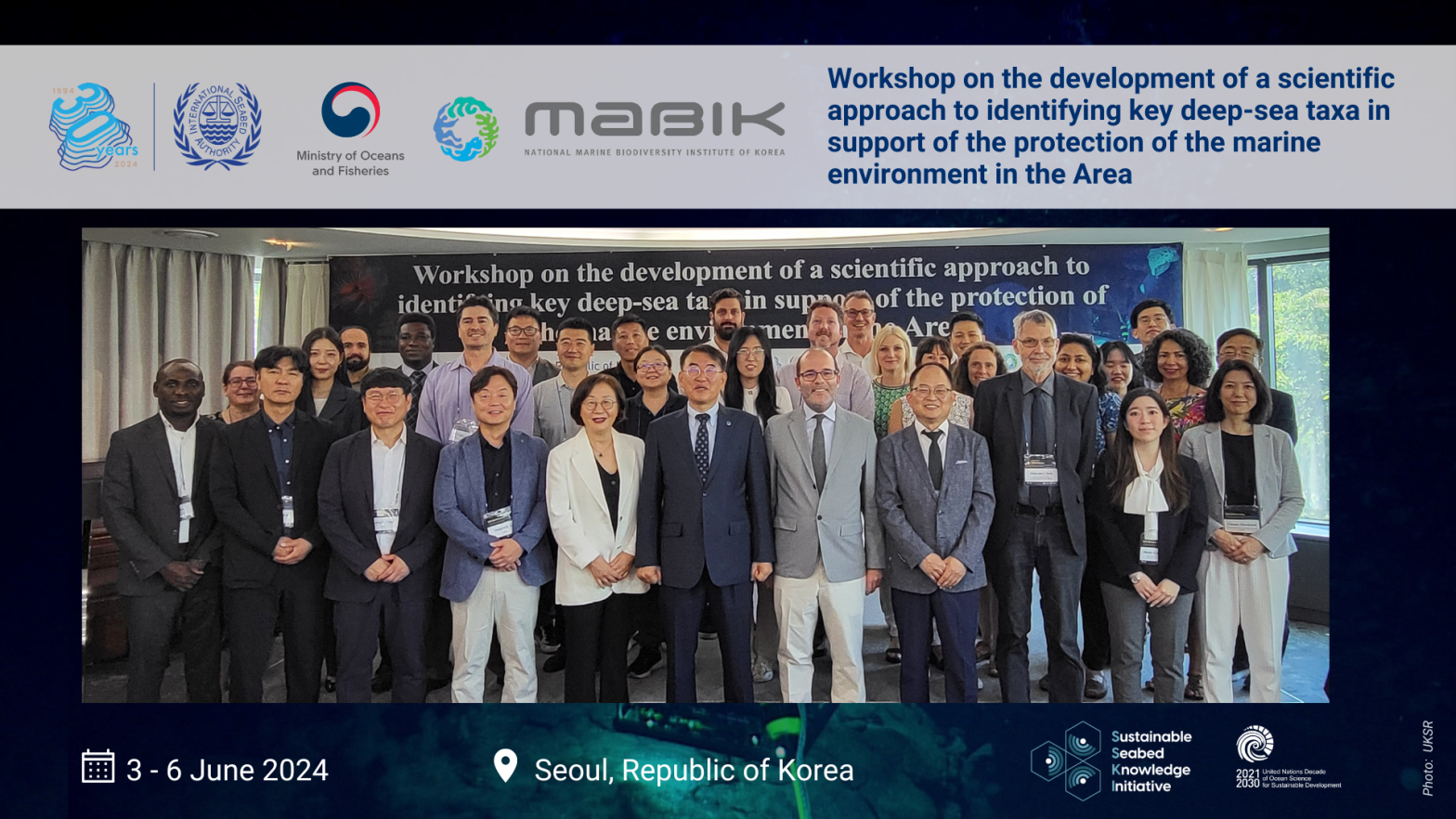Kingston, Jamaica – On 6 June 2024, the International Seabed Authority (ISA), in collaboration with the Ministry of Oceans and Fisheries of the Republic of Korea and the National Marine Biodiversity Institute of Korea (MABIK), successfully concluded a four-day workshop on developing a scientific approach to identifying key deep-sea taxa for the protection of the environment in the Area. This workshop marks the fifth successful edition of a workshop series to advance deep-sea taxonomic standardization under ISA’s Sustainable Seabed Knowledge Initiative (SSKI).
Speaking on behalf of ISA Secretary-General, Mr. José Dallo, Director of the Office of Environmental Management and Mineral Resources, highlighted that “coordinated efforts and information-sharing are crucial for promoting deep-sea research since conducting multidisciplinary research at such extreme depths often requires more resources and expertise.” He also indicated that “standardizing approaches and methodologies can help maximize resource efficiency and ensure targeted activities address priority needs in a coordinated manner.”
Mr. Dallo then remarked on the impact the workshop has on ISA’s mandate, “This week’s discussions will be the first step towards identifying deep-sea taxa that are particularly relevant to developing ISA measures and tools for managing activities in the Area in an environmentally responsible manner.”
SSKI is one of the key initiatives implemented to advance ISA’s Action Plan for Marine Scientific Research in support of the UN Decade of Ocean Science for Sustainable Development, which identifies standardizing methodologies for deep-sea biodiversity assessments as a strategic research priority. Identifying deep-sea taxa that characterize habitats relevant to activities in the Area (abyssal plains, ridges, hydrothermal vents and seamounts) contributes to establishing a robust scientific basis for the development and implementation of various tools and measures for protecting the marine environment in the Area.
Dr. Wan-hyun Choi, President of MABIK, highlighted the importance of taxonomy in understanding deep-sea biodiversity. “Modern science and technology enable us to shed light on these species. Taxonomy is the first step in that direction,” Dr. Choi said.
“MABIK, which hosts over 9,000 marine species and 560,000 specimens, is committed to expanding its capabilities to gain knowledge and collect specimens of deep-sea organisms,” he added. Dr. Choi reiterated MABIK’s continued support for ISA’s work and expressed interest in scaling up its collaboration with ISA under SSKI to advance deep-sea research, building on the workshop’s results.
The workshop brought together 27 deep-sea scientists and experts across various disciplines from 14 countries, including seven developing countries, 13 women and 12 experts working with nine different ISA exploration contractors. The participants successfully identified characteristic environmental drivers, habitats and biological communities while acknowledging the need for continued work and focused discussions on key considerations, such as regional variation. They reaffirmed the value of SSKI activities in enhancing the understanding of regional-scale patterns of biological diversity.
The participants also discussed scientific, technical and capacity-building needs and potential activities to address these needs. These included continued opportunities for catalysing scientific collaboration, the creation of a registry of deep-sea taxonomists, the development of image/DNA reference libraries and activities to facilitate species description. They highlighted the importance of sharing existing biological samples, data and expertise for effective collaboration and maximized resource efficiency.
About ISA
The International Seabed Authority (ISA) is an autonomous intergovernmental organization mandated by the United Nations Convention on the Law of the Sea to manage the mineral resources of the seabed beyond national jurisdiction for the shared benefit of humankind. ISA is committed to the principle that all economic activities in the deep seabed, including deep-seabed mining, must be regulated and responsibly managed using the best available scientific evidence for the benefit of all nations of the world. ISA works to ensure that the voices of all States, including developing States and other stakeholders, are effectively heard in discussions around the sustainable development of the deep seabed.
For media enquiries, please contact:
Mr. Philip Janikowski, Communications Specialist, ISA, pjanikowski@isa.org.jm


